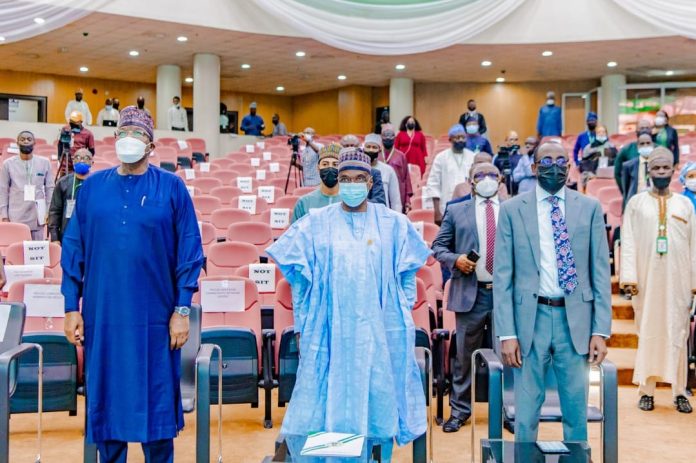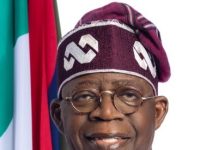The Honourable Minister of Communications and Digital Economy, Prof. Isa Ali Ibrahim Pantami has said that the Digital Transformation Technical Working Group (DT-TWG) is a critical instrument for the implementation of all pillars of the National Digital Economy Policy and Strategy (NDEPS).
The Honourable Minister, who was represented by the Permanent Secretary of the Ministry, Mr. Bitrus Bako Nabasu said this today in Abuja while delivering his remarks as the chief host and special guest of honour, at the opening ceremony of the maiden edition of “Digitalisation Hangout with DT-TWG Chairmen.”
The hangout is aimed at bringing together Members of the DT-TWG and key industry players.
Prof. Pantami quoted a 2020 Report by Deloitte which indicates that digital transformation can help accelerate progress towards enterprise goals such as financial returns, workforce diversity, and environmental targets by 22%.
He said that, “according to Gartner, global IT spending would reach $3.9 trillion in 2021 as the COVID-19 pandemic continues to act as a catalyst for digital transformation in almost every major industry,” adding that the World Economic Forum has noted that “digital transformation across the globe can benefit the region of $100 trillion between now and 2025.
He gave instances of how DTTWG is instrumental to the implementation of NDEPS, stating that on developmental Regulation, DT-TWG will be required to ensure all ICT and digital technologies-related policies and regulations are adhered to by their organizations in a manner that enables national development.
“Service and Soft Infrastructure are critical to achieving appropriate Government Digital Services (GDS) deployment and strengthening public confidence in the use of digital technologies and services. DT-TWGs are expected to support the Federal Government in developing citizen-friendly digital mechanisms to support service innovations and digital transformation for a Digital Nigeria. DT-TWGs are required to give preference to indigenous digital solutions while making IT decisions in their respective organisations in line with Executive Orders 003 and 005 of President Muhammadu Buhari, GCFR. This is also in line with the NDEPS pillar on indigenous content development and adoption, to mention a few,” the minister stated.
Prof Pantami pointed out that at the centre of this transformation is human capital development, which without it, according to him, nothing can be achieved.
While giving his opening remarks, Director General, National Information Technology Development Agency (NITDA), Mallam Kashifu Inuwa Abdullahi CCIE said, “We expect a drastic surge in digital transformation initiatives within the public sector in the coming years to keep up with the pace of digital shift.”
He estimated as reported by Statista, in 2020, that the global digital transformation spending was $1.31 trillion from $1.18 trillion USD in 2019 which he said is projected that, the spending will reach 1.78 trillion by 2022.
He cited another research by the International Data Corporation (IDC) that predicts the direct digital transformation investments will total $6.8 trillion between 2020 and 2023.
He stated further that, the report confirmed that 65% of the world’s GDP is set to be digitalised by 2022, and 70% of all organisations globally will have accelerated use of digital technologies. This he said, implies transforming existing business processes and models to drive customer engagement, employee productivity, and business resiliency.
“Today, we have achieved another milestone by creating a platform for bringing together the DT-TWG members and the key players in the technology industry. We hope this engagement will foster cooperation between the DTTWGs and technology industry players and provide a platform where experiences, achievements, and challenges will be shared”, the DG said.
“We are optimistic that this will also be a platform for constructive stakeholders’ inputs and buy-in and ultimately a medium for rights decisions and devising feasible strategies towards improving digital transformation maturity in the public sector” he added.
Mallam Abdullahi stated that “we have ensured that the composition of DT-TWG of each Federal Public Institutions (FPIs), consists of 10 members cutting across strategic departments with at least two (2) persons from the IT/ICT/e-Government departments and three other persons from core business departments of the FPIs”.
He explained that this composition is to ensure that the core business and the IT people cooperate and develop the capability to manage digital transformation projects successfully.
According to Mallam Abbdullahi, criteria of membership of the DT-TWG’s mandates that the Group shall be chaired by the Director/Head of ICT/IT/e-Government except where there is no such designation. The Chief Executives are at liberty to choose the leader of the group.
NITDA Boss revealed that the Agency has organised training that lasted for a month in which 442 members were certified. The DT-TWG members were taken through the basic required knowledge to carry out their responsibilities efficiently while leading digital transformation in their organisation.
The Managing Director, Nigeria Communication Satellite, Mrs Abimbola Alale while giving her goodwill message said the hangout is apt as it is coming at the time the Head of Service of the Federation has directed that all government processes should be digitalised.
During a goodwill message delivered by the founder and Chief Executive Officer of MainOne Ms Funke Opeke, mentioned that there is no denying the role that digital technology is playing in transforming the way businesses are carried out. She affirmed her organisations willingness to continue to partner with the Agency to develop a sustainable digital economy.
Other industry heavy weights in attendance includes Executive Vice Chairman NCC, NIPOST, Korea International Cooperation Agency (KOICA) Nigeria, Nigeria Computer Society, Delloite Nigeria, Sidmach, Backbone Connectivity limited, Ntel, Cyberspace limited and many more.








